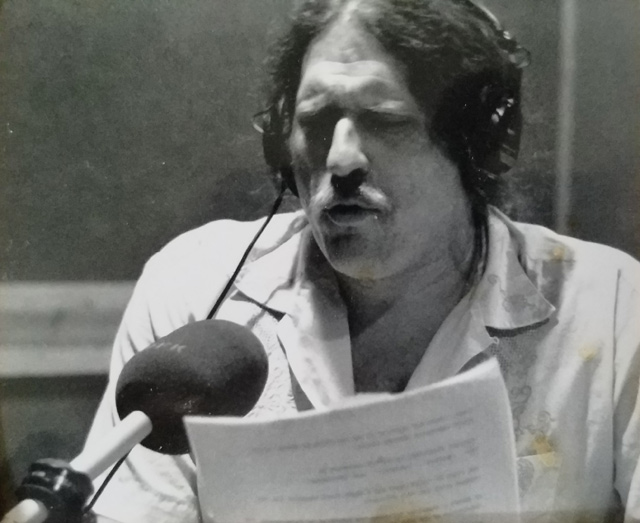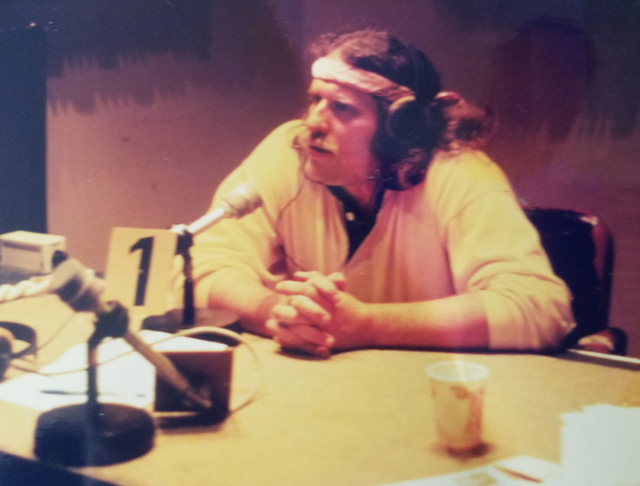
In 1983, Corey Dubin was in the newsroom at KPFK-Los Angeles when a story came over the wire about people with hemophilia who had taken life-saving blood-clotting drugs. It was likely they were contaminated with what was soon to be known as the human immunodeficiency virus (HIV). This was a shattering story for Corey, who had grown up with the painful, life-protracted medical condition. At the time, he was director of News and Public Affairs at KPFK-Pacifica Radio, where he reported extensively on the Pacific Rim, the Caribbean, Indigenous America, and the Nation States of South, Central, and North America. Now, this “mysterious,” untreatable disease — warned about in the early 1980s by the courageous Dr. Don Francis of the Centers for Disease Control and which had spawned callous discrimination against gay, Haitian, and drug injecting communities — had infected the vast majority of those with hemophilia, including himself.
Corey had been an advocate for the hemophilia community since his teenage years. Influenced by his father’s strong example of medical advocacy, he’d established peer-led support groups and a big brother program with the Hemophilia Foundation of Southern California in Los Angeles, his home since his birth on March 3, 1955. Liberation from trauma, including medical trauma, was a political act, Corey believed, a manifestation of social justice to positively transform society.
This call to service drew Corey to independent broadcasting. He began his career at KCSB-FM, located at the University of California, Santa Barbara, as student radio journalist. His activism coalesced into managing news and analysis, and he became the station’s public affairs director and president of the UC Radio Network. During those early years, he met the Chumash elders and community, which nurtured a lifelong involvement with indigenous politics and peoples. He reported extensively from the 1978 Humqaq Occupation, the Chumash nation occupation of the sacred site of Point Conception to protest development plans by a liquefied gas company.
Graduation led to freelance journalism and Pacifica Radio at a time when foreign policy was guided by the “hot wars” of Reagan’s Cold War. Corey coproduced Covert Action, which documented the CIA’s destabilizing efforts at home and abroad. He coordinated breaking stories on the Iran-Contra scandal, focused on the Reagan administration’s sale of arms to Iran — embargoed since President Jimmy Carter’s time — to fund Contra forces in Nicaragua trying to topple the elected Sandinista government.
Corey went on to become communications coordinator of the Big Mountain Legal Defense/Offense Committee, which fought the U.S. government’s forced relocation of the Dineh people onto uranium contaminated land. He joined The Other Americas Radio as a senior producer, and under the auspices of Coyote Radio Productions, he produced weekly radio programs up until his death, for KCSB-FM and KPFKFM, including Latin American Journal and American Indian Airwaves.

When the contaminated clotting factor story broke in 1983, AIDS was a puzzling syndrome with no treatment; the stigma that arose around the deadly disease lashed the hemophilia community, as well. Its members responded with an organized activist and policy movement. By the 1990s, Corey was appointed to the California Community Planning Working Group, which authored the state’s AIDS education and prevention plans. They pushed the Ryan White Title II Comprehensive AIDS Resources Emergency Act, which provided federal grants to states to improve the quality and accessibility of treatment and care for all people living with HIV.
In 1992, Corey became the first end-user of the nation’s blood supply to sit on the Blood Products Advisory Committee at the Food and Drug Administration (FDA). The Committee of Ten Thousand — which Corey had helped form to advocate for the international hemophilia community and was named for the 10,000 people with hemophilia who had contracted HIV and other viruses — pressed the FDA to ensure the safety of blood products. Corey acquired an impressive expertise in the science of AIDS as well as an extraordinary ability to work with congressional Democrats and Republicans, who for the first time came to agreements on how to handle the AIDS crisis in the United States and abroad.
Corey was also part of a class-action suit filed in 1996 against four global pharmaceutical companies Baxter, Bayer, Alpha, and Armour. The settlement reached was far less than what they sought, so they joined with groups such as the Institute of Science and the National Academy of Sciences to coauthor the Ricky Ray Act to provide compassionate payments to those with HIV from contaminated blood products.
Corey felt a deep rage from the devastating experience of Big Pharma’s unconscionable acts. Yet he never let it eclipse his love and vision for humankind and the multiple ways that life could otherwise be lived. Throughout his work, Corey gave a voice to the voiceless. He was enamored of the technical beauty and art of radio as much as he was committed to tirelessly training and mentoring generations of community radio programmers. Whether incisively interviewing guests or facilitating a heated on-air debate, he had a natural knack for instant human connection, and he had a breathtaking intellectual command of politics both near and far.
Corey Dubin is survived by longtime and loving friends, activist colleagues, radio coworkers, and radio listeners. He leaves his loving wife of 26 years, Faviana “Phoebe” Hirsch-Dubin; his children, Kaile Laubua Acuna-Dubin, Checole Acuna, and Sasheen Acuna; 12 grandchildren; and his sister, Randi Dubin King. Together we honor Corey’s vast caring soul and his tireless life’s work of service to communities throughout the world. In lieu of flowers, contributions can be made to the Committee of Ten Thousand, 4913 Randel Rd., Oneida, NY 13421, attn. Chad Blair, Treas., or to KCSB-FM Santa Barbara online at kcsb.org.
